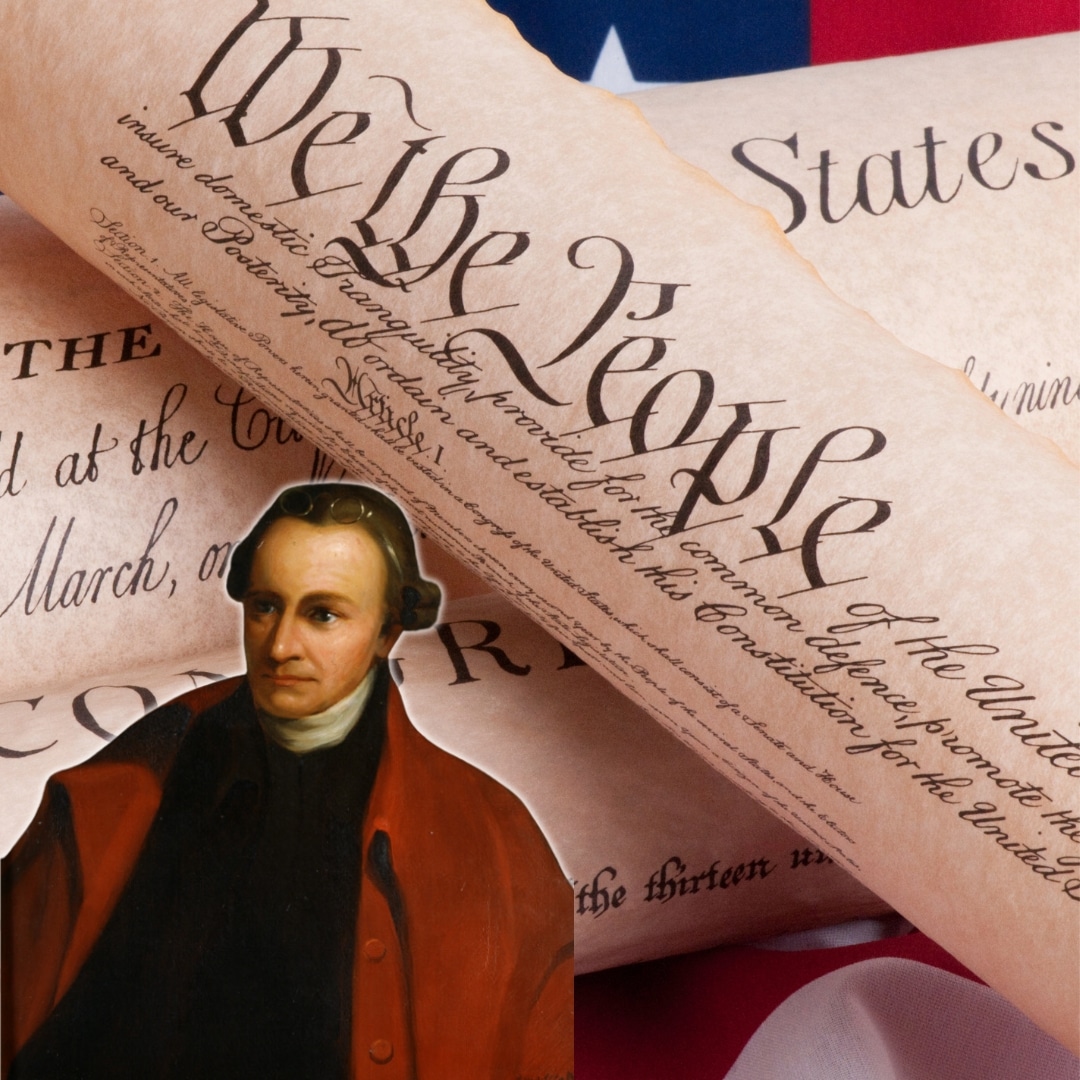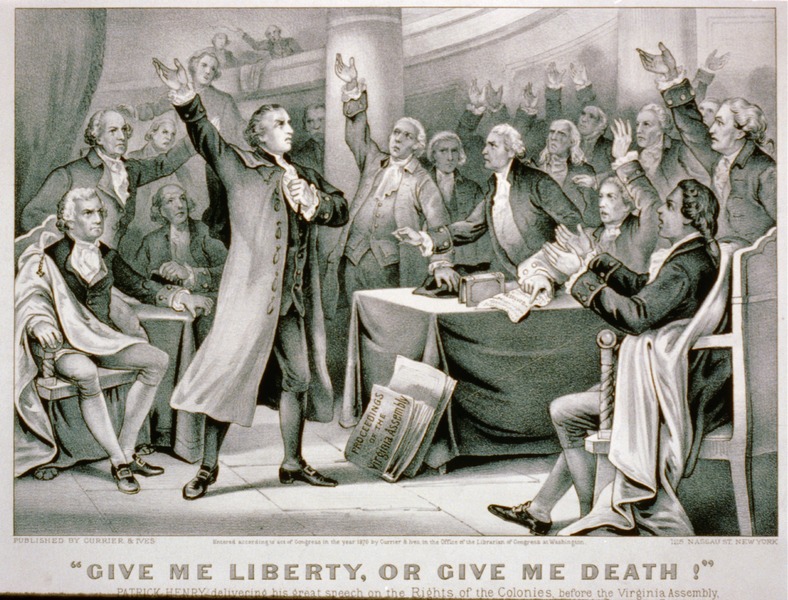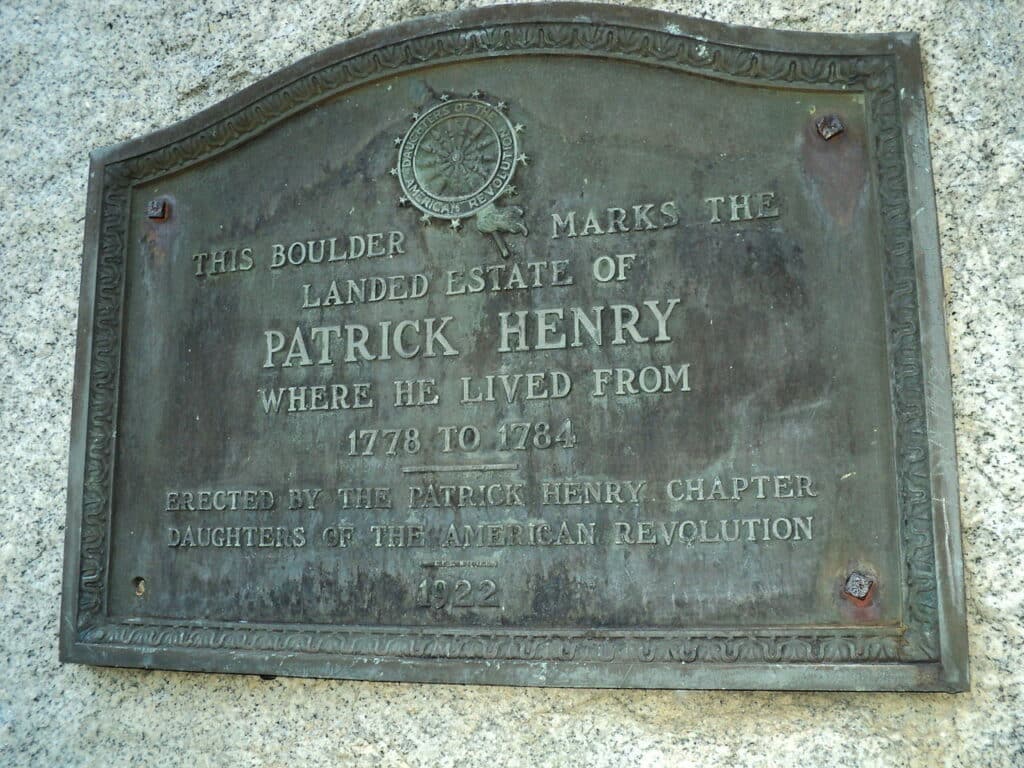
Patrick Henry, one of the founding father's of the United States of America, exemplified the Sheepdog Ethos with his infamous declaration "Give me Liberty, or give me Death!". This iconic phrase, embodying the spirit of the American Revolution, marks the pinnacle of Henry's spirit and defiance in the face of tyranny.
From his formative years to his lasting impact on the nascent republic, we explore not only the historical significance of Henry's words but also the enduring relevance of his call to liberty in today's discourse.

Patrick Henry's formative years were marked by a unique blend of self-taught legal education and the influential presence of his politically active family. Born into a family with a strong tradition of colonial politics, Henry absorbed the principles of liberty and self-governance from an early age. His father, John Henry, and his uncle provided him with an education that would later be complemented by his natural oratory skills and acute understanding of legal principles, despite not having formal legal training.
In 1765, Henry was elected to the Virginia House of Burgesses, where he quickly emerged as a vocal opponent of Great Britain's overreaching policies, including the Stamp Act. Subsequently, his impassioned speeches, particularly the famous "Give me Liberty, or give me Death!" address, were pivotal in rallying the American colonists against British rule. Representing Louisa County, Henry's fiery orations and resolutions laid the groundwork for the revolution.
Henry's confrontations with Governor Lord Dunmore of Virginia notably demonstrated his leadership and commitment to the colonial cause. In fact, his early experiences and innate leadership abilities were instrumental in shaping his role as a revolutionary figure and a champion of the American pursuit of independence.

Having established himself as a powerful voice against British control, Patrick Henry's "Give me Liberty, or give me Death!" speech epitomized the American colonists' demand for independence. Delivered at the Virginia Convention in 1775, this stirring call to freedom was a defining moment that showcased Henry's reputation as a passionate and persuasive orator. Unsurprisingly, his words echoed the sentiments of an oppressed people and crystallized the revolutionary spirit that would lead to the formation of a new nation.
As Governor of Virginia, Henry served three consecutive one-year terms, during which he remained an ardent defender of American liberties. Furthermore, his leadership of the Virginia Militia in 1775 demonstrated his willingness to confront British tyranny directly, further solidifying his status as a symbol of resistance. Despite opportunities to shape the nascent country at the federal level, including an offer to become Secretary of State, Henry chose to decline these roles due to health concerns.
Henry's influence extended beyond his speeches. In fact, his staunch opposition to a powerful central government played a crucial role in the eventual adoption of the Bill of Rights. Ultimately, his foresight and dedication to individual freedoms left an indelible mark on the American political landscape, ensuring his legacy as a champion of liberty.
Patrick Henry's early political career was marked by his vocal opposition to the Stamp Act of 1765. As a newly elected member of the Virginia House of Burgesses, Henry introduced the Virginia Resolves, which argued that only the colonial assemblies had the right to tax the colonies. His resolute stance against this unpopular British policy helped galvanize resistance across the colonies, making him a prominent figure in the fight against British taxation without representation.
In 1775, as tensions with Britain escalated, Henry was appointed the leader of the Virginia Militia. His leadership during this crucial period demonstrated his commitment to the colonial cause and his readiness to take decisive action against British forces. Henry's command helped to mobilize and organize Virginia's defenses, playing a key role in the early stages of the American Revolutionary War.
After the American Revolution, Henry remained deeply involved in shaping the new nation's government. He was a staunch advocate for the inclusion of a Bill of Rights in the U.S. Constitution. Henry feared that without explicit protections, individual liberties could be jeopardized by a powerful central government. His persistent advocacy was instrumental in the eventual adoption of the first ten amendments, which safeguard fundamental rights and freedoms.
Despite his prominent role in the revolution and early American politics, Henry repeatedly declined federal positions offered to him, including Secretary of State and Chief Justice of the Supreme Court. His refusals were often due to health concerns and his preference for state politics over national roles. This decision highlighted his enduring commitment to Virginia and his belief in the importance of state sovereignty.
Henry was a strong supporter of religious freedom, believing that all individuals should have the right to practice their faith without government interference. He advocated for the disestablishment of the Anglican Church in Virginia, contributing to the broader movement for religious liberty. His efforts helped to ensure that religious freedom became a foundational principle in the new nation.
In 1775, Henry co-founded Hampden-Sydney College in Virginia, one of the oldest higher education institutions in the United States. The college was established to provide a classical education and to cultivate the principles of liberty and self-governance. Henry's involvement in its founding reflected his commitment to education and the nurturing of future leaders who would uphold the values of the American Revolution.
Henry was a vocal opponent of the original U.S. Constitution, fearing that it granted too much power to the federal government at the expense of states' rights. During the Virginia Ratifying Convention, he argued passionately against its adoption without significant amendments. Although he was ultimately unsuccessful in blocking its ratification, his efforts led to the adoption of the Bill of Rights, addressing many of his concerns.
Henry played a significant role in the Virginia Convention of 1788, where he continued to champion individual liberties and states' rights. His speeches and arguments during the convention were pivotal in shaping the debate over the ratification of the U.S. Constitution. His influence ensured that the voices of those wary of a strong central government were heard and considered.

Patrick Henry's principles, particularly his vehement opposition to an overreaching central authority, have consistently influenced American history, shaping the nation's dedication to individual liberties and democratic ideals. His legacy is not only etched in the spirited words that ignited the flame of revolution but also in the tangible institutions that have preserved freedom in the United States.
As the first post-colonial Governor of Virginia, Henry set a precedent for leadership deeply rooted in protecting individual rights. Furthermore, elected as both the 1st and 6th Governor of Virginia, Henry's tenure underscored the importance of a government that serves its people. His term as Governor, succeeded by Thomas Jefferson, another stalwart of American independence, highlights a lineage of thought leaders instrumental in shaping the nation's early political landscape.
After being re-elected twice, Henry's influence extended beyond Virginia, reaching the halls of New York and beyond, where the 26 amendments that constitute the Bill of Rights echo his unwavering stance against tyranny.
Patrick Henry's enduring legacy as a revolutionary leader and staunch advocate for individual rights continues to inspire, reminding us of the timeless struggle for liberty and justice in the United States. Consequently, his life and principles serve as a beacon, illustrating the ongoing challenge of upholding the ideals of liberty and justice in a constantly evolving political landscape
Patrick Henry's unyielding advocacy for liberty and staunch resistance to federal overreach cemented his legacy as one of America's most ardent defenders of individual rights. His impassioned oratory, epitomized by the iconic "Give me Liberty, or give me Death!" speech, galvanized a movement for independence and stoked the flames of revolution.
Henry's influence endures in the annals of history, embodying the spirit of the American fight for self-determination and constitutional governance. His life's work, from his early political career to his pivotal role in securing the Bill of Rights, continues to resonate, offering timeless lessons on liberty, justice, and the American identity.
Patrick Henry remains a beacon of inspiration, reminding us of the enduring struggle to uphold the ideals of freedom and democracy. His legacy challenges us to persist in the defense of individual rights and to honor the principles that form the foundation of the United States.
Patrick Henry, a fiery orator, embodied the revolutionary spirit with his impassioned plea for independence. His fervent advocacy for liberty and national freedom resisted British tyranny, underscoring his strong demand for autonomy.
Patrick Henry was a fervent revolutionary and eloquent orator. He was also a passionate patriot, charismatic leader, skilled lawyer, defender of rights, controversial figure, liberty advocate, and visionary thinker during the American Revolution.
Patrick Henry's speech, delivered with rhetorical brilliance at the Virginia Convention, passionately appealed for colonial rights and liberty. He countered oppressive British policies with persuasive argument and impassioned oratory, fueling revolutionary fervor.
Patrick Henry, amidst the liberty contradiction and slave paradox, owned approximately 60 slaves. This highlights the ownership ethics and morality debate within historical context, as he balanced personal wealth and human rights against abolition complexity.
Paul Revere: Profile of a Sheepdog says:
[…] key figures and towns of the approaching British forces, thereby mobilizing colonial resistance. Patrick Henry's "Give me Liberty, or give me Death!" speech inspired many revolutionaries to act decisively in the face of British […]